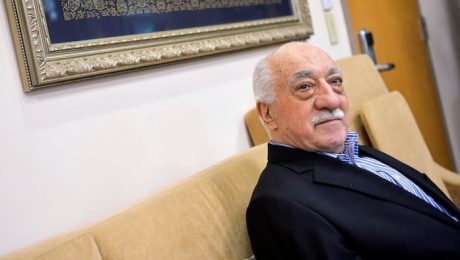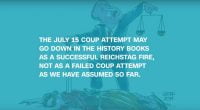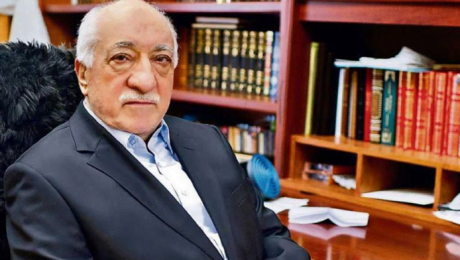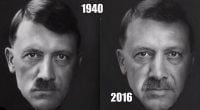Keyword: Military coups in Turkey

Turkey’s counter-terrorism campaign [against Hizmet] discredited
The agenda of the Turkish authorities [against Hizmet] goes far beyond the attempted coup, it is about the need to neutralise a movement that became a political threat when its followers within the judiciary and police started exposing corruption within the government’s ruling inner circle in December 2013.

On Gülen vs Erdogan – “And not equal are the good deed and the bad”
Martin Luther, the Christian leader who is called “the Father of the Reformation,” described two kingdoms: the kingdom of the world and the kingdom of heaven. In the contrasts between Erdoğan and Gülen, we surely see examples of this distinction.

US State Department ‘Can’t Imagine’ Accepting Erdogan Offer to Trade Hostage Pastor for Gulen
“President Erdogan’s suggestion that the U.S. should make a hostage-style prisoner swap for an innocent American imprisoned in Turkey is appalling and will not be taken seriously,” Sen. James Lankford (R-OK) said. Brunson’s is not the first case that has resulted in a Western country accusing Erdogan of hostage diplomacy.

Gülen resorts to UN to investigate Turkey’s coup
The U.S.-based cleric Fethullah Gülen calls the United Nations to form an international commission to investigate Turkey’s controversial coup attempt on July 15, 2016, and to acquit himself after Turkey’s President Recep Tayyip Erdoğan accused him of launching the coup d’état.

Turkey’s Curious Coup in 6 Questions
A year after the Turkey’s coup attempt, there are still many questions that need to be considered. Ismail Sezgin of Hizmet Studies, in this video, summarizes the findings that makes the coup attempt so curious and the positions of the Turkish Government, Gulen Movement, and Turkey’s Western allies.

Turkish-Armenian intellectual says failed coup staged to purge Gülen followers
Turkish-Armenian linguist and writer Sevan Nişanyan, who escaped from a prison in İzmir in July, shared his take on a failed coup in Turkey last year, saying it was staged in order to cleanse the Turkish military of followers of US-based Turkish Islamic scholar Fethullah Gülen.

Turkish Gov’t Systematically Violated 12 Fundamental Rights During Emergency Rule
Sezgin Tanrıkulu, a deputy from Turkey’s main opposition Republican People’s Party (CHP), has announced that Turkish government has systematically violated 12 fundamental human rights during the ongoing state of emergency in the country.

Fethullah Gulen: Erdogan is not Fit to be President
Legal experts discussed Erdogan’s eligibility to serve as president, because of questions about his college education. Other have questioned the fairness of the elections and there are allegations of electoral fraud. But aside from this, if the Turkish people elect a shepherd as their leader, I respect their choice. But personally I don’t see Erdogan is fit to be president.

Turkey’s Erdogan and July 15 coup
Like many autocratic leaders, Erdogan was quick to blame members of opposition and sympathizers of Gulen Movement for the coup attempt. He particularly singled out the United States-based Turkish cleric, Fethullah Gulen as the mastermind of the coup, even when it is on record that the highly-respected cleric publicly condemned the coup when it was still on.

Family, friends losing hope as Calgary imam arrested in Turkey remains imprisoned
For a year, Calgary imam Davud Hanci has spent most of his days in solitary confinement in Turkey, accused of being a terrorist linked to failed 2016 coup attempt. “They’re just holding him there and they don’t want to release him because they don’t have any real evidence,” said Malik Muradov, executive director of Calgary’s Intercultural Dialogue Institute and a friend of Hanci.

Gülen, a man of peace, not behind attempted coup in Turkey
Despite Gülen’s repeated denials of any involvement and his open call for an investigation by an international commission, no concrete effort has been made to find out the true perpetrators of the heinous attempt. Instead, a state of emergency, which still continues today, was declared and is used to silence the opposition and all other critical voices.

Turkish PM admits did not know identity of putschists when he blamed Gülen movement
A year after a failed coup on July 15, 2016, Turkish Prime Minister Binali Yıldırım said he did not know who had attempted to carry out the coup when they blamed the Gülen movement, in an interview published in Hürriyet.

Turkey’s Curious Coup – positions of the Turkish Government, Gulen Movement and Turkey’s Western allies
Within days of the coup attempt, James Clapper, the then-Director of US National Intelligence, said that they had not seen any intelligence indicating Gülen’s involvement. Bruno Kahl, head of Germany’s BND foreign intelligence agency, said during an interview in March 2017 that he did not believe Gülen was behind the coup.



















